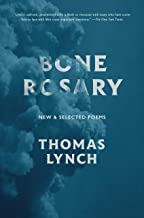Bone Rosary: New and Selected Poems by Thomas Lynch 2021
Despite the weird title (a bone rosary is a bunch of marrow bones chewed by his dog, strung on a rope, and hung from his pier), Lynch has written a beautiful volume of poetry, both collected and new. If you don’t know Thomas Lynch, you’re missing out on one of my very favorite writers. In essays, fiction, and poetry, this 73 year old from Milford, MI takes his life experience as a small town undertaker, the owner of a family hand-me-down cottage in a small Irish village, a recovered alcoholic, and a father, husband, and friend and combines them into compelling commentaries on life. Growing up as the son of an undertaker, Lynch had an early and personal connection with death before following in the family’s business (as have his sons!) and it had a profound impact on his view of life and death. Another major influence was the family land and cottage near the sea in County Clare on the west coast of Ireland. Whether writing about his Aunt Nora or the men at the pub, he evokes an Ireland that is both harsh and beautiful.
Death is never far from Lynch’s thoughts. In the preface he tolls a litany of losses—poet friends Donald, Hall, Dennis O’Driscoll, Seamus Heaney, Jim Harrison, Philip Casey, Macdara Woods, and Matthew Sweeney followed by his old dog, Bill W. (named for Wordsworth)—and shocked me with the news of his daughter’s suicide just after COVID hit. Divorce and loss have driven him to an isolated life in a cabin on the shores of a Michigan lake except when he’s alone in his Irish cottage. Being alone provides him with solitude, not loneliness, and his writing reflects the peace and quiet of that time spent in/with solitude.
He’s capable of both lyrical beauty and tongue-in-cheek humor. The latter is seen in a poem about Ann Arbor: “Notably,/when folks get horizontal, breathless, still:/life in Milford ends. They call. I send a car.” Funny pacing and idioms are made even funnier if you had read his earlier book of poems entitled “Still Life in Milford”.
My favorite poem is the longest one, in memory of his Aunt Nora Lynch (1902-1992) entitled ‘Moveen Notebook’ after the village where she lived. In it he writes, about how his aunt ‘gives out the names she kept alive‘ and goes on to write: ‘the mention of the name that keeps the name alive/and what it was they did or didn’t do/to win the race or save the day or just survive—-/the extraordinary moment we attribute to/them alone, irrevocably. Them only.’
Lynch is quite wonderful and this book, while a bit uneven through its 250 pages of poetry, is a good place to start.



